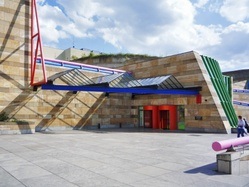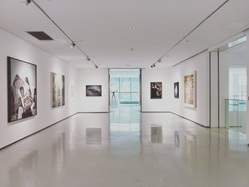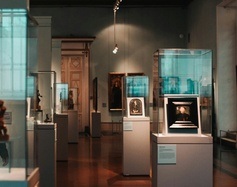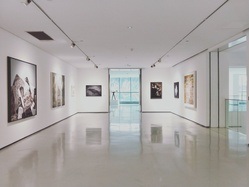
Erinnerungsort Hotel Silber
In the location's words:
The "Hotel Silber" in Stuttgart was the headquarters of the Secret State Police during the Nazi era. The building was used by the police for more than half a century and was the headquarters of the Gestapo for Württemberg and Hohenzollern. In the former site of Nazi terror, a place of historical and political learning and encounter has been created as a citizen participation project. Exhibitions and events deal with perpetrators and their victims, with the police and their role in dictatorship and democracy.
The institution is run by the Haus der Geschichte Baden-Württemberg. Its partner is the Initiative Lern- und Gedenkort Hotel Silber e. V. (Learning and Memorial Site Hotel Silber e. V.) as part of a civic participation agreement. Together with the House of History, the state capital Stuttgart, the Baden-Württemberg State Agency for Civic Education and the State Working Group of Memorial Sites and Memorial Site Initiatives in Baden-Württemberg, it helps to shape the program of the Hotel Silber memorial site. The facility is financed by the state of Baden-Württemberg and the state capital Stuttgart.
The permanent exhibition of the House of History Baden-Württemberg in the "Hotel Silber" deals with the history of the police in the building. It shows continuities and ruptures in their dealings with minorities and in law enforcement, but also the self-image of police officers in democracy and dictatorship. Why did the transition from the Weimar Republic to Nazi rule function almost smoothly? Who was sent from the "Hotel Silber" to occupied territories during the Second World War and was responsible for mass murders there? Which groups of people remained in the police's sights after 1945? Original objects as well as documents, images and media convey a differentiated picture of the perpetrators and show the consequences of their actions for the victims.
Gestapo on trial. The persecution of Nazi criminals
The first special exhibition at the Hotel Silber memorial site in Stuttgart sheds light on the difficult and cumbersome process of coming to terms with the actions of the Secret State Police under National Socialism. "Gestapo in Court - The Persecution of Nazi Criminals" looks at who was put on trial and who was not, who had to go to prison and who was able to live on unmolested despite their atrocities. The exhibition shows why criminal prosecution in the Federal Republic was so slow. It also looks at the impact of prominent trials.
The Gestapo was involved in almost all National Socialist crimes: Mistreatment, deportations, persecution, murders of numerous people. But only a few had to stand trial for these crimes. Proceedings such as the Auschwitz trial, however, triggered social discussions about how to deal with the Nazi past: Is the enforcement of the law paramount? Or should it be weighed against "social peace" in the country of the perpetrators and a line drawn? How long after the crime does atonement make sense?
This content has been machine translated.Öffnungszeiten
Future events by Erinnerungsort Hotel Silber
Similar pages
 Museum
Museum
Staatsgalerie Stuttgart
 Museum
Museum
StadtPalais - Museum fü…
 Museum
Museum
Mercedes Benz Museum
 Museum
Museum
Naturkundemuseum Stuttg…
 Museum
Museum
Das Porsche Museum
 Museum
Museum
Linden Museum
 Museum
Museum
Kunstmuseum Stuttgart
 Museum
Museum
Haus der Geschichte Bad…
 Museum
Museum
Galerie Stadt Sindelfin…
 Museum
Museum
Weissenhofmuseum
 Museum
Museum
Faszination Psyche - Ei…
 Museum
Museum
Planetarium Stuttgart
 Museum
Museum
Städtisches Lapidarium
 Museum
Museum
Straßenbahnmuseum
 Museum
Museum
Weinbaumuseum Stuttgart
 Museum
Museum
Stauffenberg-Erinnerung…
 Museum
Museum
Stuttgarter Museen
 Museum
Museum
Museum der Illusionen S…
 Museum
Museum
Landesmuseum Württemberg



